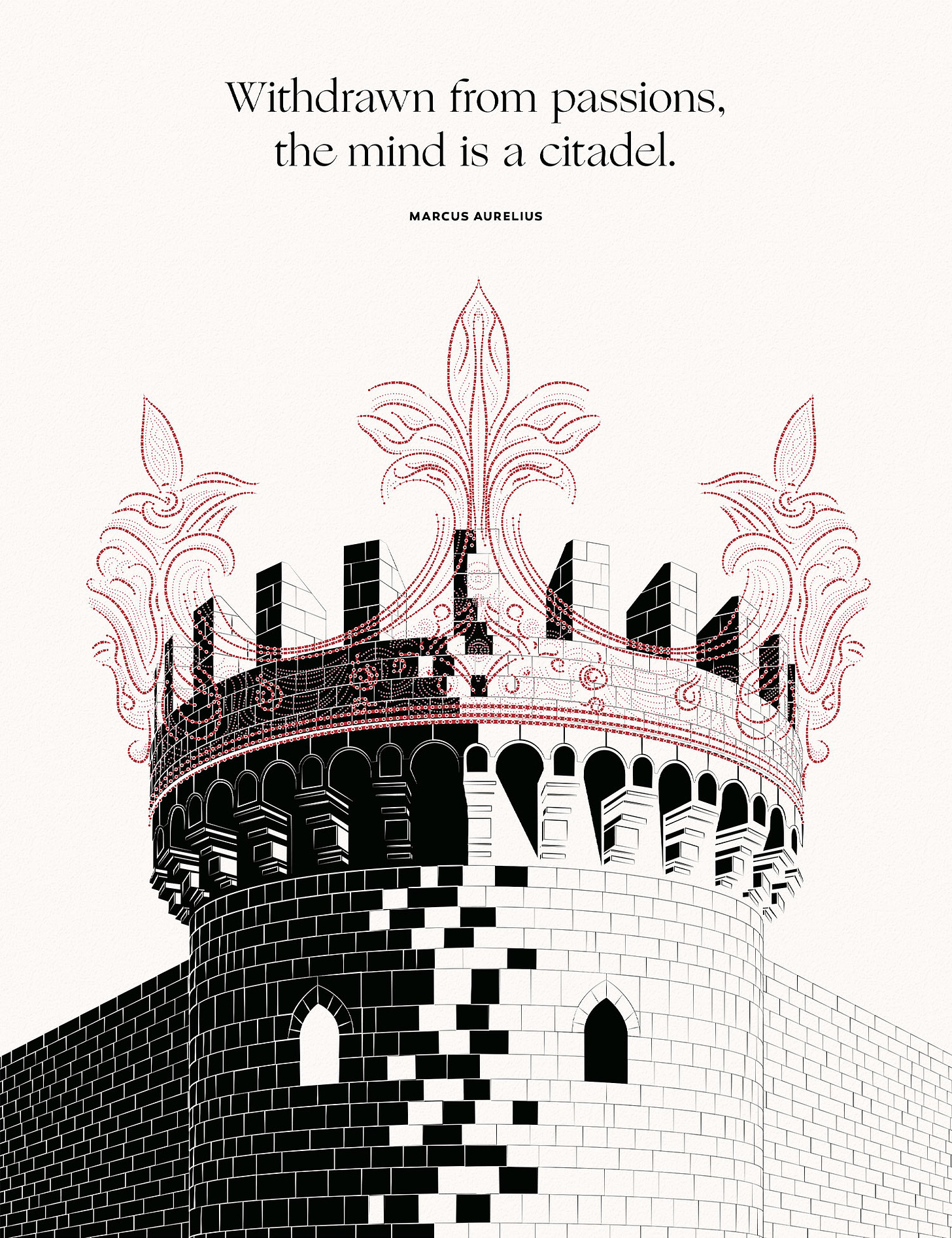
Marcus Aurelius on the Only Thing You Truly Control
“Remember that the governing self becomes invincible when it withdraws into itself and is satisfied with itself, doing nothing which it does not will to do, even if its opposition is unreasonable. How much more then when it decides both with reason and circumspection about a given case? On this account the understanding free from passions is a citadel of refuge; for man has nothing stronger into which to retreat and be thereafter inexpugnable. He then who has not seen this is uninstructed; he who has seen it and does not retreat is unfortunate. Withdrawn from passions, the mind is a citadel.” - Marcus Aurelius, The Meditations, VIII, xlviii
As I mentioned in a few other Aurelius posts, the inner citadel is a crucial concept in stoicism. And I suspect my resistance to the notion that there is a place of unassailable peace somewhere up in my noodle speaks more to my own failings than the author’s philosophy. I mean, therapy, psych meds and self-help books aren’t billion-dollar industries for nothing!
But while reading Aurelius for my current book project, I occasionally find myself bristling at his demands and, not gonna lie, getting a little worked up. Bro, really? The emperor is going to tell me how whatever lowly circumstance I find myself in, I should just be content to roll over and meditate? I’m onto you, guy!
You have to remember that Aurelius was writing this for himself, not for us. So when he cracks the whip or wags a finger, he was being hard on himself, not us. As such, The Meditations are best read as advice from your own inner conscience, like having your own personal Jiminy Cricket with a sweet beard. They invite us to listen to Aurelius’ supremely disciplined inner thoughts, and to hijack them for our own growth.
So how does an ancient Roman perceive the relationship of a person to themselves? You can start with a familiar word that still has meaning to us, the psyche. In Greek, it means the “soul,” and Aurelius thought of the soul as the whole, integrated person (or perhaps “personality,” since it was distinct from the body.)
Our baser instincts and impulses were the pathē, or passions, which is what he is referring to in the above quotation. When your passions rule you, you are a slave to them. Freud referred to it as the id (“das es”).
Our rational mind, our ego, spinning its wheels and working out what is happening and what we can do, is the nous, the mind or the intellect. It’s the part that reasons and rationalizes, works through possibilities, determines what is, but not necessarily what ought to be. The mind is clever. It is a great tool, but it can be deceived by false ideas, and can be manipulated by the passions into all sorts of destructive equivocations.
Our higher-minded, our most moral, most principled best selves he called the hegemonikon, which is translated above as the “governing self.” It seems to me that it is something akin to the super-ego, or if you prefer old school, the daemon, the guiding spirit. Where the mind is clever, the governing self is wise. Where the mind asks “what can I do?” the governing self asks, “what ought I do?” And where the mind can convince itself of a falsehood (usually because it is pleasing to one passion or another to believe a fiction or rationalize a choice), the hegemonikon instinctively knows right from wrong. Socrates spoke of his “daemon” as having a voice that told him when to refrain from doing or saying something that was wrong.
In theory, the inner citadel of one’s mind should be a place of refuge and tranquility, but only when once you have mastered your mind and passions, and put them in service of your own soul.
This theme of an indomitable inner space, comes up again and again in literature. As Henley wrote in Invictus, “I am the master of my fate, / I am the captain of my soul.” And at the other extreme, we find a character like Hamlet unable to find peace when he says “I could be bounded in a nut shell and count myself a king of infinite space, were it not that I have bad dreams.”
This is pure speculation on my part, but I’ve always wondered if Shakespeare wasn’t thinking of a walnut which bears an uncanny resemblance to the brain, and that the nutshell was Hamlet’s head. From this perspective, he is in fact “bounded in a nut shell,” a prisoner in his own inner citadel.
And of course, by the end of the play, the same man who couldn’t find escape from his own mind, transforms into the man with a tranquil mind in the face of his own death, when he says, “If it be now, 'tis not to come; if it be not to come, it will be now; if it be not now, yet it will come—the readiness is all…let be.”
I should stop there before I make the leap to an analysis of Let it Be by The Beatles (Paul was clearly the governing self). With the book well underway now, there will be more Aurelius coming in the next two months. I hope you’re enjoying learning more about his philosophy as much I am enjoying reading it, and I hope you’re enjoying the commencement of your holiday season!
Our holiday sale is ongoing. Save 25% in the shop with HOLIDAY2023.



